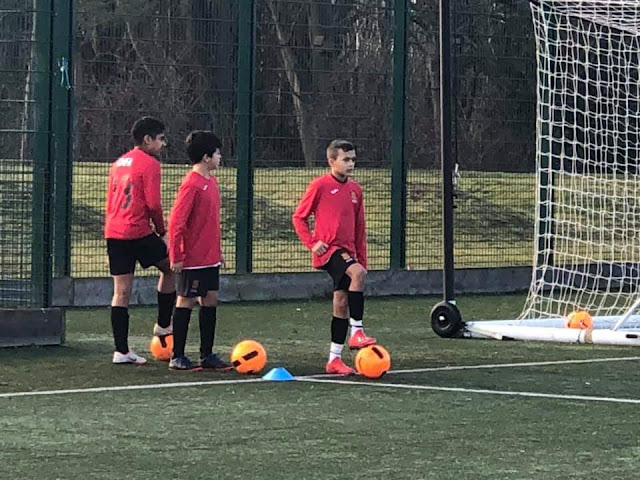Game intelligence
Game intelligence is quantified by a participant's
capability to make smart decisions on the pitch and make them quickly. A wise
footballer intends to maintain the game as clean as possible while optimizing
outcomes minimizing energy expenditure. Game intelligence suggests playing
smarter, not harder. Sign up for a football program to understand the way to be
a smart player.
Game intelligence includes 3 skills:
Spatial awareness
Spatial awareness refers to a player's ability to see
distance clearly across the entire pitch and utilize it to their benefit. What
does it mean to see space obviously?
First of all, need to know about the space around them.
According to the place of the ball, their teammates, along with their
competitions, where should they be? If they are moving to be given a pass?
Should they're drawing defenders away in their teammate who has the ball to
make space?
Second, intelligent players are always aware of where their
teammates are where they should be according to the positioning of another
team. There are two reasons they will need to understand where their teammates
are and should be: (1) to inform them where they should be if they're not
there, and (2) to expect their own teammate's standing and produce a fast,
instinctive pass without looking. In fact, scouts frequently start looking for
this sixth feel of a footballer.
Last, intelligent players are incredibly aware of the geometry of this game. They know how to position themselves and other people to
make broad angles and simple passing chances for themselves while on crime and
narrow angles and hard passing opportunities for their competitors while on
defense.
Spatial awareness is a complex skill that encompasses a
number of other skills absolutely vital to achieving success in football. In
reality, spatial awareness is also closely associated with another game
intelligence skill, the knowledge that is tactical.
Tactical knowledge
Tactical knowledge refers to a participant's knowledge of
the nature and structure of the game. The creation of a group influences the
tactics they'll use to acquire. Soccer formations have changed radically
throughout recent years. If you want to be an intelligent soccer player, it's a
fantastic idea to have to know the several types of formations used today and
the tactics and strategies that come along with everyone.
While spatial awareness assists players view their chances,
tactical knowledge leads to your player's ability. Because of this, tactically
smart players are great at maintaining possession instead of only waiting for
the correct moment to strike but also producing the ideal moment to attack. By
anticipating the movements of their own players and their opponents, the ball cans
move throughout the field, creating gaps in the defense of the team until they
have enough space.
Tactical intelligence is also vital to performing perhaps
even significant and well on protection. On defense, players must be assessing
the area to accurately anticipate their competitors' next moves. Should they
anticipate properly, they could shut down their opponents' angles, avert easy
passes between them, and force them to make a mistake.
Tactical intelligence is especially important for the center
backs and central midfielders because these players are in the ideal position
not just to see the whole pitch but also to speak with and command their
teammates. But extraordinary tactical knowledge is very important for anyone
who actually wishes to achieve good success in football.
Risk evaluation
Risk refers to the fact that certain aggressive decisions
could cause loss of ownership (or failure to regain possession in the event of
diving or handling on defense). Each team member must expend additional energy
until they regain control when a team loses possession. Such aggressive
conclusions could result in over-expenditure of power and inability to carry
out well for the whole 90 minutes of this game. On the flip side, an entire
lack of decisions in an attempt to conserve energy and maintain possession
could prevent the team and finally result in a reduction.
Physical Exercise
Physical fitness is another vital component to achieving
success in football; a soccer match lasts for 90 -- 95 minutes using hardly any
subs. In accordance with Livestrong, midfielders operate an average of over 11
km per match. Wingers perform the most “high-intensity" runs averaging
nearly 150 sprints of 75% of the entire speed per game. Apart from goalkeepers,
center-backs run the least but still average 9.5 kilometers per match.
Along with speed and endurance, footballers need balance and
physical power to defend the ball at their own feet, to take, to pass the ball
long distances, to win balls out of the atmosphere, etc.
In conclusion, physical fitness in soccer comprises 4 components
that are essential:
According to dictionary.com, endurance is the ability or
strength to continue to survive particularly despite exhaustion, anxiety, or
other negative conditions. That is, endurance does not merely refer to make it. It
also refers to a player's mental strength and capability to continue despite
the overwhelming fatigue he or she might feel.
Footballers must not just survive mentally. Since the body
fatigues, control, attention, and decision making becomes more and more
difficult. The ability to perform both physically and mentally for at least 90
minutes is vital to attaining success.
"The vision of a champion is bent over, drenched in
sweat, at the stage of exhaustion when nobody is looking."
Mia Hamm
Fantastic equilibrium and coordination are essential skills
for footballers. Footballers are usually moving quickly in tiny distances
either weaving through defenders or, on defense, keeping up with all the
motions of criminals. Moving quickly in spaces with one foot on the ball requires
a superb amount of coordination and balance. Balance and coordination (mixed
with pace) are exactly what makes a player nimble and agility is a necessary
skill for the very best footballers.



Comments
Post a Comment